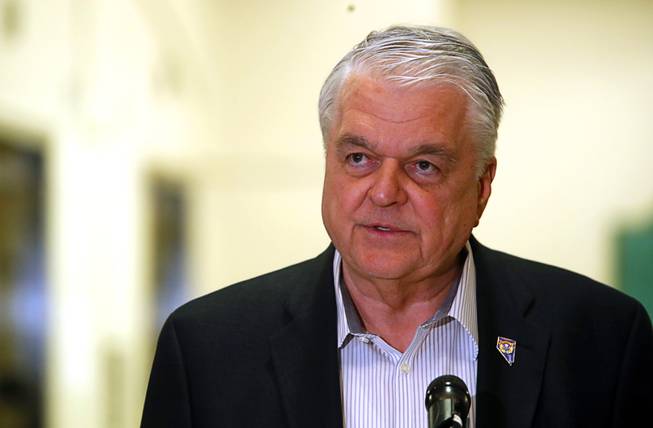
Nevada Gov. Steve Sisolak speaks during a news conference at the Sawyer State Building in Las Vegas,Tuesday, March 17, 2020. Sisolak ordered a monthlong closure of casinos and other non-essential businesses in order to stem the spread of the new coronavirus (COVID-19).
Monday, July 6, 2020 | 7:10 p.m.
Gov. Steve Sisolak’s plan to tackle a $1.2 billion budget deficit caused by the coronavirus crisis calls for massive cuts to education and health services, the state announced Monday evening.
Of the $711 million of state funding approved for K-12 education for the fiscal year that began July 1, $156 million is cut in the proposal Nevada lawmakers will tackle starting Wednesday in Carson City during a special session.
The most significant cut would be $70 million from the New Nevada Education Funding Plan, which extends further per-pupil funding for some English-learning students or students who are eligible for a free or reduced-price lunch. Other cuts include $4.5 million to a teacher reimbursement program for classroom supplies, money to help with class-size reduction and $29 million for teacher advancement incentives.
The proposal also calls for $190 million in cuts to higher education out of its approved budget of $694 million.
“Addressing this budget is the first step to get through the immediate crisis at hand, but then I look forward to partnering with all of you to take hold of this opportunity to reinvent our state so when Nevada’s children grow up and stand in the positions we are in now, they won’t have to make these same devastating decisions,” Sisolak wrote in a Monday letter to lawmakers.
The report released by the governor’s office reiterates the state will be “forced to take deep cuts in services and programs designed to help many of those most impacted by the COVID-19 pandemic.”
The proposal also eliminates parts of the state’s Medicaid program by trimming $233 million from the $1.5 billion allotment from the Department of Health and Human Services. The cuts could impact the nearly 700,000 Nevadans on Medicaid, including eliminating services in biofeedback and neurotherapy ($6.8 million), optometry for adults ($3.2 million), psychosocial rehabilitation for adults ($1.6 million), among other proposals for elimination. The department accounts for 33.5% of the state budget.
The 40-page report details the pandemic’s impact on revenue, including visitation to Nevada being off by 97.3% during nearly 80 days of nonessential business closures. During the past three months, 250,000 jobs have been lost statewide, easily passing the 180,000 jobs lost in the late 2000s during the Great Recession.
Some of the recommended cuts were expected, such as trimming $549 million from agency budgets, furloughing state employees, transferring of money from the rainy day fund and reducing one-time appropriations. The proposal includes a merit-pay increase freeze and 12 furlough days for state employees, as well as keeping 700 positions in the state government vacant. State Sen. Joyce Woodhouse, D-Henderson, previously said furloughs would help save around $10 million a month, or $120 million for the year.
“My proposal preserves as much funding as possible for our most essential priorities: health, education and the state workforce, so they are able to continue providing the vital services on which Nevadans rely,” Sisolak said in a statement.
The report says options to fill the deficit are “extremely limited” without additional revenue or federal assistance. New revenue streams are ”not viable” due to the time they would take to set up, meaning a tax increase is unlikely to occur.
Rather, the report says options during the special session will be “short-term, stop-gap measures to help sustain critical public services until the Legislature convenes in a regular session in 2021.”
If things change, and revenue comes in higher than expected, Sisolak says he will prioritize education, health and human services and the state workforce in restoring funding.
“Everybody’s going to have to give a little. We have to maintain public safety, we have to maintain public health, and to what extent can we do that,” Assembly Minority Leader Robin Titus, R-Wellington, said last week.
